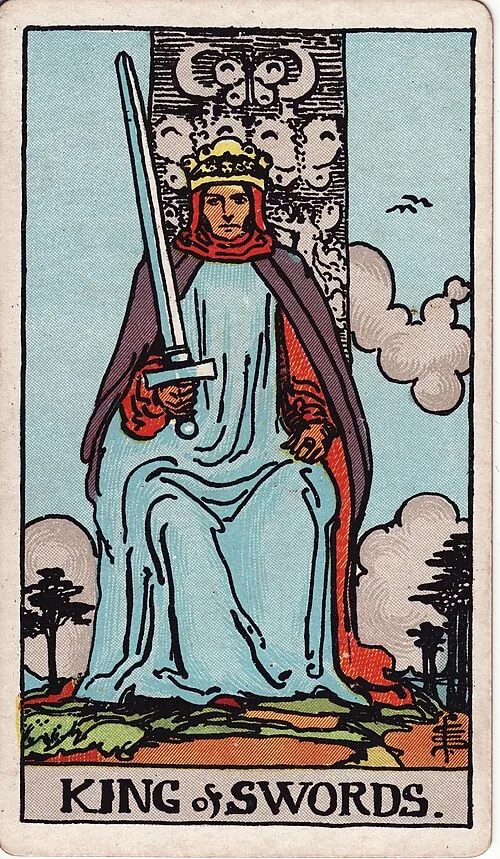 | Upright: Mental authority, discipline, truth, justice, sharp intellect, leadership Reversed: Manipulation, authoritarianism, coldness, injustice, confusion, harshness |
The King of Swords, seated on his throne with a sword in hand, embodies the essence of mental authority and discipline. This card represents seeing truth with sharp intellect and leading with fairness. Yet, this power can turn rigid without empathy’s balance.
Numerological Value
As a court card, the King of Swords has no specific numerical value. Instead, it reflects fully matured mental dominance and intellectual leadership.
Element
Tied to Air, this card is shaped by intellect, communication, and mental sharpness. Air infuses the King of Swords with analytical clarity and authority.
Astrological Value
Linked to Libra and Aquarius, the King of Swords draws on these signs’ pursuit of justice and mental discipline, enhancing its themes of truth and leadership.
General Meaning of the Card
| Upright Meaning | Reversed Meaning |
|---|---|
| Mental authority and sharp intellect | Manipulative or authoritarian attitude |
| Pursuit of justice and truth | Coldness or emotional distance |
| Disciplined and analytical leadership | Unjust or harsh behavior |
| Clear communication and honesty | Confusion and poor decisions |
| Strong decision-making and strategy | Controlling or oppressive approach |
| Objectivity and rational thought | Sharp or sarcastic communication |
| Card’s Message: | Card’s Message: |
| – Defend truth, be fair! | – Build empathy, soften harshness! |
| – Use your intellect, lead! | – Let go of control, find balance! |
| – Proceed with discipline, stay clear! | – Clear confusion, be honest! |
“Govern the realm of truth with unwavering discipline, but crown your leadership with the wisdom of empathy and unwavering justice!”
Love and Relationship Readings
Upright Meaning
In love, the King of Swords brings honesty and clear communication. Fair, rational talks with your partner can solidify your bond, though emotional warmth may be needed. If single, you seek mental alignment and discipline; stay objective but not distant.
Reversed Meaning
Reversed, love faces authoritarian or cold behavior. You may seem manipulative or detached to your partner; show empathy. If single, confusion or rigid standards could block new connections; be flexible.
Career and Work Readings
Upright Meaning
At work, the King of Swords signals mental authority and disciplined leadership. Your strategic intellect leads projects, making clear decisions. If job hunting, your professional, objective stance shines; showcase your leadership skills.
Reversed Meaning
Reversed, work sees controlling or unjust behavior causing tension. Manipulative communication or poor decisions may disrupt the workplace; be constructive. If seeking opportunities, confusion could slow you; make a clear plan.
Finances and Money
Upright Meaning
Financially, the King of Swords brings a disciplined, rational approach to decisions. Strategic planning and objectivity strengthen your investments; clarity drives success. A fair, honest approach ensures financial security.
Reversed Meaning
Reversed, financial manipulation or harshness could lead to errors. Controlling behavior or confusion may cause mistakes; be cautious. An empathetic, balanced strategy restores clarity.
Personality and Archetypes
Upright Meaning
Upright, the King of Swords describes a disciplined, sharp mind. Like the “Just Leader” archetype, this person is objective and authoritative.
Reversed Meaning
Reversed, it’s a controlling or cold character. The “Harsh Ruler” archetype struggles with harshness or manipulation.
Health
Upright Meaning
In health, the King of Swords brings mental discipline and healthy boundaries. You might adopt rational approaches or routines to manage stress; clarity supports wellness. Don’t overlook emotional balance, though.
Reversed Meaning
Reversed, mental stress or coldness may affect health. Controlling behavior or confusion could lead to tension; approach with empathy. Regular rest or meditation helps.
Yes/No
Upright Meaning
Yes—Discipline and truth pave the way; proceed.
Reversed Meaning
No—Manipulation and confusion block; wait.
Symbolism of the Card
The visual symbolism of the King of Swords portrays a figure embodying the pinnacle of mental authority, unwavering discipline, and a leadership style rooted in logic and objectivity. Enthroned and commanding, the noble king typically holds his sword aloft, a potent emblem of his superior intellect, exceptional analytical prowess, clear and decisive thought, and the resolute power to articulate truth without compromise. The upward orientation of the sword signifies a commitment to justice, an unyielding adherence to honesty, and the assertion of intellectual dominance through reasoned judgment.
The sword held firmly within the King’s grasp represents a keen intellect, the capacity for rigorous logical deduction, unwavering objectivity, profound discipline, and the ability to evaluate situations and individuals with an unbiased and discerning mind, untouched by emotional sentimentality. His steadfast grip on the weapon underscores his decisiveness in thought, his clarity in making judgments, and his profound awareness of his own mental fortitude. The sword can also symbolize direct and unambiguous communication, the establishment of firm boundaries, and the judicious exercise of authority when necessary.
The clouds in the sky that often form the backdrop of the King of Swords card symbolize the dynamic and often complex realm of the intellect, the depth of thought, and the potential for underlying intellectual complexities that the King navigates with mastery. This atmospheric element reflects the King’s capacity for deep analysis, his ability to consider multifaceted issues, and his intellectual depth. The clouds can also hint at the ever-present need for clarity and the potential for intellectual challenges that demand his sharp mind.
The throne upon which the King sits embodies his inherent authority, his capacity for control, his commitment to discipline, and his natural leadership qualities. Often depicted as structurally sound and unembellished, the throne suggests that the King’s power derives not from superficial displays but from his inner strength, his intellectual sovereignty, and his unwavering dedication to just governance. The throne symbolizes his autonomous decision-making abilities and his profound sense of responsibility in wielding his power.
The air element, the fundamental domain of the Swords suit, permeates the King of Swords, signifying the realm of analytical thought, direct communication, keen intellect, logical reasoning, and unwavering objectivity. In this card, the air element underscores the King’s piercing intellect, his exceptional ability to draw logical inferences, his commitment to honest and forthright communication, his tendency to remain free from emotional biases, and his disciplined approach to thought. This rigorous analytical and disciplined mindset can sometimes be perceived as emotional detachment or a stern demeanor.
The King’s regal and authoritative posture embodies his intellectual strength, his unwavering discipline, his resolute determination, and his inherent leadership capabilities. This bearing indicates that he is guided by reason and principle rather than emotional impulses, and that he shoulders the responsibility of making fair and just decisions with gravitas. However, this authority is ideally tempered with wisdom and a nuanced understanding of the human condition.
In essence, the symbolism of the King of Swords emphasizes profound mental authority, unwavering discipline, an unwavering commitment to justice, exceptional intellectual acuity, and a leadership style grounded in logic. The card symbolizes the power to rule with truth and to make decisive judgments, while also implicitly urging the wielder of such power to temper it with empathy and a deep understanding of the complexities of human experience.
General Description of the Card
The King of Swords stands as one of the most intellectually commanding and authoritative figures within the Tarot court, embodying a crystal-clear mind, an iron-clad discipline, a resolute logical approach, and an unwavering commitment to just leadership. This card resonates with the mythological archetype of the sky god Zeus, with his supreme authority and rational judgment, or the wise and just rulers of ancient lore. Much like a sagacious monarch who wields the sword of truth with precision yet tempers justice with wisdom and understanding, the King of Swords represents a leader who governs with intellect and principle. This card evokes the just and learned king of epic tales, whose intellect, discipline, and authority guide his realm, ideally balanced with empathy and a genuine concern for the well-being of his subjects.
Psychologically, the King of Swords can represent a highly developed logical mind, a disciplined and structured approach to thought, the capacity for objective decision-making, the ability to establish and maintain clear authority, and a strong adherence to ethical principles. It can be linked to the Jungian archetype of the “wise old man” in its mature, rational, and authoritative aspects, or the archetype of the “just ruler,” who governs with fairness and integrity. This card symbolizes the individual’s desire to be guided by reason and principle rather than emotional responses, while also underscoring the importance of tempering this rationality with empathy and a deep understanding of human nature. Drawing from Freudian concepts, it can be interpreted as the ego’s firm adherence to the reality principle and the superego’s just and authoritative judgment, ideally balanced with ego strength and compassion. The individual is determined to see truth clearly, make fair decisions, and wield authority effectively, while also being mindful of the emotional landscape of those they lead.
The dominant presence of the air element in this card underscores the clarity of thought, the directness of communication, the paramount importance of intellectual analysis, and a disciplined approach to mental processes. The mind operates with the precision of a well-honed blade, capable of dissecting complex issues with logic and making resolute judgments. The clouds in the sky hint at intellectual depth and the capacity to comprehend multifaceted situations, while the King’s throne symbolizes his authority, discipline, and leadership. The King of Swords is akin to a wise leader who maintains their composure amidst intellectual storms, guiding with intellect yet striving to balance it with empathy and a deep understanding of the human heart. This card serves as a vital reminder to embrace the power of truth and authority while wielding it with fairness, empathy, and a profound sense of responsibility.
When the King of Swords appears upright in a reading, it signifies a period in your life characterized by strong mental authority, unwavering discipline, and a commitment to making fair and just decisions based on clear logic and objective analysis. Your ability to see truth with clarity, formulate strategic plans, and exercise your authority effectively is heightened. You are capable of making sound judgments, establishing clear boundaries, and leading with confidence and integrity. This card often marks a time when your honesty, sense of justice, discipline, and sharp intellect serve as your guiding principles. However, it is a crucial reminder to temper this powerful intellect and authority with empathy, understanding, and a genuine consideration for the emotional well-being of those around you.
When the King of Swords appears in a reversed position, it can signal the misuse of authority, controlling behaviors, injustice, manipulation, or emotional coldness. There may be a tendency to be rigid, overly critical, authoritarian, or even tyrannical in your approach. You might disregard the feelings of others, prioritize your own agenda without considering the impact on others, or wield your intellect in a manipulative or confusing manner. This can lead to mistrust in relationships, conflicts in your professional life, and feelings of isolation. The reversed King of Swords serves as a clear warning that you need to temper your intellectual power and authority with greater empathy, compassion, and a profound sense of fairness. Your rigidity and emotional detachment may be alienating those around you and undermining your effectiveness as a leader or figure of authority.
Upright Meaning Explanation
When the King of Swords stands upright, a fortress rises in your mind; you wield truth clearly, whispering, “I’m in control!” Picture a fair, disciplined talk with your partner in love; honest words strengthen your bond. Or at work, you lead a project with strategic wit; your authority shines. This card paints mental authority and discipline; truths are clear, your will steadfast. Life offers a throne—sword raised, path open; it’s time to lead.
There’s a note: Be empathetic. Say you’re planning finances with discipline; your intellect excels, but rigidity won’t help. The King of Swords says, “Lead”—this discipline strengthens, elevates you. It adds: “Be fair, approach with love.” That sword is your mind’s craft, opportunities yours—each step a balance. The card calls you back to that throne; defend truth, navigate with heart.
Reversed Meaning Explanation
Reversed, the King of Swords sees authority shadowed; sword in hand, but you murmur, “Why am I so controlling?” Imagine being cold or manipulative to your partner in love; harsh words strain your bond. Or at work, an authoritarian stance or confusion stalls a project; your dominance sparks tension. This card tells of manipulation and injustice; intellect remains, but direction falters. Life says, “Pause, soften”—shadows linger, but you must find balance.
It’s a mirror—look within. Say a financial decision went awry from control; now you ask, “Why was I so harsh?” Reversed, the King of Swords says, “Be kind”—maybe you manipulated, or were confused. But that sword is still yours—it needs softening. It whispers, “Don’t quit, balance”—harshness fades, you can clarify. The King of Swords reversed calls you to that throne; victory begins with empathy.
Key Message of the Card
“Defend truth with discipline, lead with empathy!”







